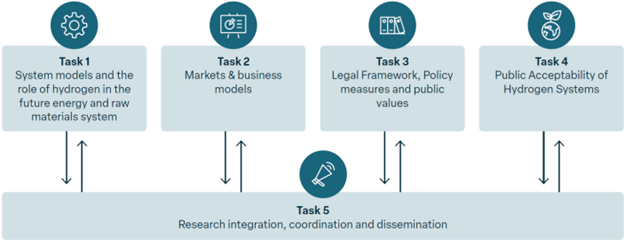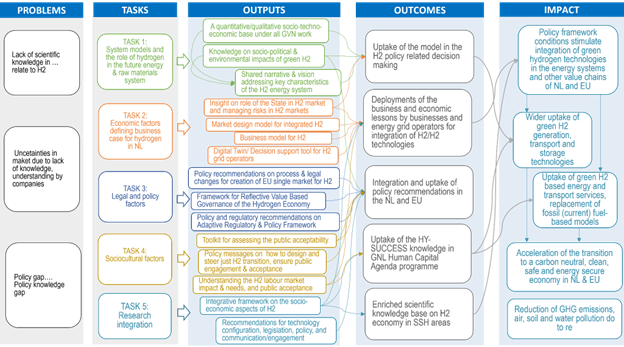HySUCCESS - Social, User aCCeptable, Economically Sustainable Systems for Hydrogen

Hy-SUCCESS (Social, User aCCeptable, Economically Sustainable Systems for hydrogen) is a groundbreaking research initiative under the GroenvermogenNL programme. It focuses on the non-technological aspects of hydrogen to understand its potential role in a sustainable energy system. The project brings together experts in economics, law, psychology, sustainability, and energy systems to address barriers and enablers for large-scale hydrogen adoption.
The Hy-SUCCESS consortium consists of representatives of ten universities, five universities of applied sciences, one research institute, three industrial partners, and an industry association. It is part of GroenvermogenNL, the Dutch flagship programme on building a hydrogen economy in the Netherlands.
Objectives
The successful transition to a large-scale green hydrogen economy requires more than just technological innovation. Social acceptance, economic viability, and a supportive regulatory environment are crucial to achieving this transformation. The Hy-SUCCESS project aims to provide a comprehensive overview of which socioeconomic factors influence the potential role of green hydrogen in a sustainable energy system.
Specifically, the project will examine how economic, legal, policy, and sociocultural factors can either enable or hinder the implementation of hydrogen in the energy system. It will also identify strategies to overcome significant barriers and strengthen enabling conditions to facilitate the deployment of hydrogen. Additionally, the project will assess the environmental impact of hydrogen applications and explore ways to minimize potential negative effects. Through these insights, the project will clarify the potential role of hydrogen in future energy and material systems.
The project aims to:
-
Assess the environmental, economic, and social impacts of hydrogen systems.
-
Develop policy recommendations to improve the feasibility of hydrogen.
-
Understand public perception and acceptance of hydrogen configurations.
-
Provide integrated insights about the potential role of hydrogen in the future energy system for policymakers, industries, and stakeholders.
Research areas
Hy-SUCCESS is structured around five key research areas, each addressing a critical aspect of hydrogen implementation and its role in the future energy system:
-
System Modeling and the role of hydrogen in the future energy and raw material system (Task 1)
Evaluating the role of hydrogen in achieving a carbon-neutral energy system. We will develop system models to assess different hydrogen production and usage scenarios, analyze the integration of hydrogen into existing energy infrastructure, and estimate the environmental footprint of various hydrogen configurations. The aim is to provide policymakers with data-driven insights on how hydrogen can contribute to sustainability goals. -
Market and business models (Task 2)
Investigate the financial and economic aspects of hydrogen configurations. We will examine market structures, potential business models, cost-benefit analyses, investment risks, and global hydrogen supply chain dynamics. By identifying key economic enablers and obstacles, we aim to propose strategies for a competitive and economically viable hydrogen economy. -
Legal Frameworks, policy measures and public values (Task 3)
Effective governance and regulation are essential for a sustainable hydrogen market. We will explore legal and policy frameworks that influence hydrogen deployment, including contracts, incentives, subsidies, trade regulations, and safety standards. We aim to identify necessary policy adjustments to foster a supportive legal environment for hydrogen expansion. -
Public acceptability of hydrogen configurations
Understanding public perception and social factors is crucial for the large-scale adoption of hydrogen. We aim to examine which factors affect public support of hydrogen configurations, including concerns about safety and environmental impacts, and the role of public engagement in shaping energy policies. Additionally, we will examine hydrogen's effects on labor markets, job creation, and skill requirements for a hydrogen-based economy. -
Integration and knowledge dissemination (Task 5)
To ensure cross-disciplinary collaboration and effective communication of findings, we will synthesize insights from the four areas above. We aim to bridge gaps between research, industry, and policymakers by disseminating results through reports, workshops, and public engagement initiatives, thereby ensuring that research outcomes contribute to national and European hydrogen policies.

Expected outcomes
Hy-SUCCESS is set to drive the future of hydrogen by identifying and addressing critical barriers that could affect its implementation and slow down its adoption. By bridging the gap between technology, policy, economics, and societal acceptance, this project will provide insights into the feasibility of a roadmap for a socially and economically sustainable hydrogen economy. Its outcomes will shape national and European hydrogen policies, offering valuable insights for industries, policymakers, and researchers.
Through interdisciplinary collaboration, Hy-SUCCESS will study whether and how we can enhance public trust, create new business opportunities, and support the development of a robust hydrogen infrastructure. Ultimately, the project’s findings will accelerate the transition toward a cleaner, more sustainable energy future, by better understanding the potential contribution of positioning hydrogen as a key player in global decarbonization efforts.

Project leaders

Linda Steg is professor of Environmental Psychology at the University of Groningen. She is an internationally renowned pioneering researcher in Environmental Psychology, widely acknowledged for outstanding scientific achievements and research with high societal impact for combating environmental problems such as climate change. She received the prestigious Stevin prize from the Dutch National Science Foundation NWO, that is awarded annually to maximum two Dutch researchers with international reputations for excellent scientific research with high societal impact. Moreover, she is a laureate of the Dutch Royal Decoration with appointment as the Knight of the Order of the Netherlands Lion for outstanding professional achievements, fellow of the Royal Netherlands Academy of Arts and Sciences, and fellow of the Academy of Sciences and Arts. She is ranked as one of the world’s most influential scientific minds by Thomson Reuters. Steg studies factors influencing sustainable behaviour and lifestyles, the effects and acceptability of strategies and policy aimed at promoting sustainable behaviour and lifestyles, and the implications of sustainable lifestyles for quality of life.

Henk Akkermans is a Professor of Supply Chain Management at Tilburg University. His research addresses how inter-organisational supply chains and networks, where no single party exerts full control, can effectively coordinate their behaviour. He focuses on technical, innovation-driven sectors, both in the private and public sector. Akkermans has a profound interest in the exceptional importance of smart asset management for our present-day economy and is the director of the World Class Maintenance institute in Breda. Here, he is interested in the interactions between shop floor operations and customer demand, and in the roles of management information and cognitive limitations in decision-making therein. He uses system dynamics simulation modelling to obtain insights into these complex issues.
Consortium & partners
The Hy-SUCCESS consortium includes leading universities, research institutes, and industry partners,
Universities:
University of Groningen, Tilburg University, Eindhoven University of Technology, Erasmus University Rotterdam, Radboud University, Delft University of Technology, Leiden University, Utrecht University, University of Amsterdam, University of Twente
Universities of Applied Sciences:
Avans University of Applied Sciences, Hanze University of Applied Sciences, Hogeschool van Arnhem en Nijmegen, NHL Stenden Hogeschool, Saxion University of Applied Sciences,
Research Institutes:
TNO (Netherlands Organisation for Applied Scientific Research), Centrum voor Wiskunde en Informatica (CWI), Industry Partners, Battolyser Systems, Koninklijke Oosterhof Holman, Krohne New Technologies, Industry Associations & Collaborative Partners, World Class Maintenance, NLHydrogen, Impact & Exp.
Funding
Hy-SUCCESS is funded by the Dutch Government via GroenvermogenNL, a transition programme established by the National Growth Fund. GroenvermogenNL aims to support and expedite the widespread adoption of green hydrogen within the Dutch industrial sector, ensuring that the Netherlands plays a leading role in the development of a sustainable hydrogen economy.
The programme includes multiple R&D projects focused on overcoming key barriers to scaling up hydrogen production and its integration into existing energy systems. Hy-SUCCESS is one of the seven thematic streams within GroenvermogenNL, specifically dedicated to exploring the socioeconomic factors that influence the adoption and implementation of hydrogen technologies.
Learn more about GroenvermogenNL.
Contact & get involved
[UNDER CONSTRUCTION]
For more information about Hy-SUCCESS, collaboration opportunities, and project updates, contact us at [Insert Contact Email] or follow our progress on LinkedIn.
News and events
Events
Event: Bootcamp
Date: 02 June 2025
Location: Utrecht
News
3 November 2025 - It’s not just about the fuel: it also matters who produces hydrogen
30 September 2025 - HySUCCESS Project Leader Appointed Lead Author in Next IPCC Assessment Report
6 June 2025 - HySUCCESS Bootcamp #1: A Strong Start for a Fair and Sustainable Hydrogen Future
2 December 2024 - Kick-off HySUCCESS: National research consortium launched on non-technical factors of the green hydrogen transition
15 July 2024 - 12 million euros for research into the impact of green hydrogen

